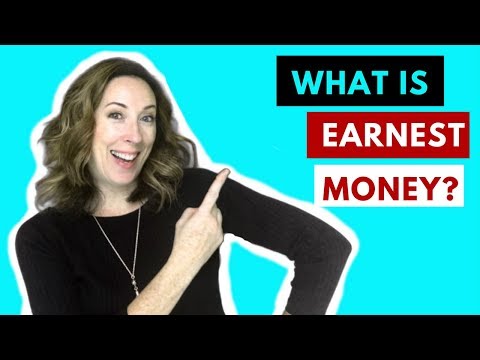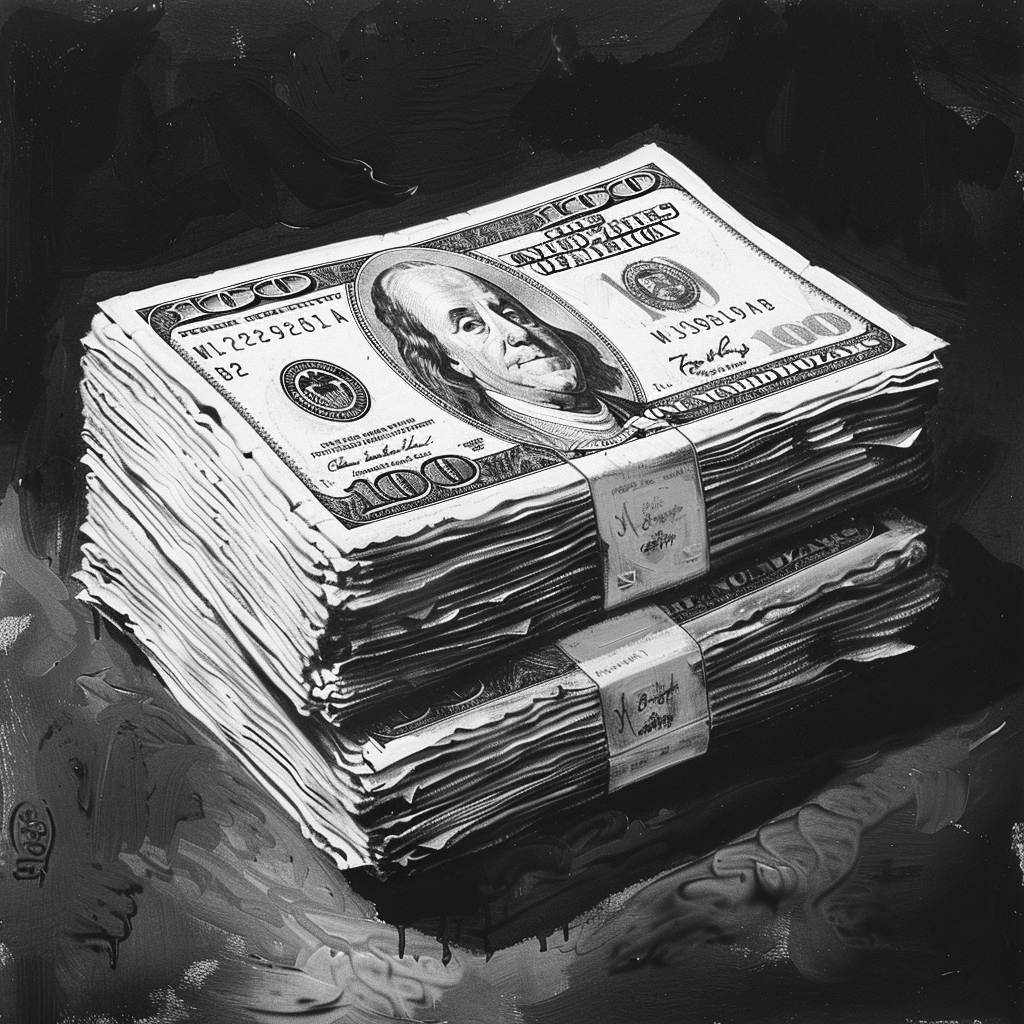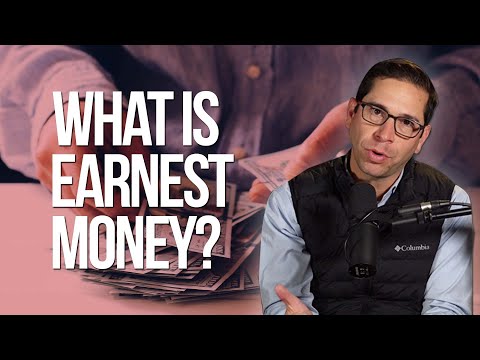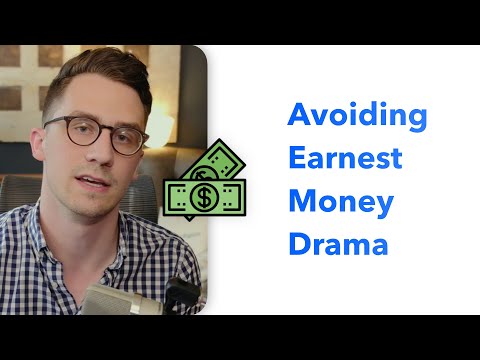Buying a home is a journey filled with excitement, anxiety, and a slew of complex terms that can make your head spin faster than a merry-go-round. One such term is “earnest money,” a critical player in the real estate game, showing a seller you’re not just kicking the tires but ready to roll. In this article, we’re peeling back the curtain to reveal the earnest money meaning, showing you how it’s a powerhouse move in the art of home buying.

Unveiling the Earnest Money Meaning: A Critical First Step in Homebuying
Understanding the earnest money meaning is kind of like learning the secret handshake in an exclusive club—once you know it, doors start to open. It’s not merely loose change slipped into the seller’s pocket; it’s your declaration of commitment. So, dear homebuyer, consider this your informative roadmap through the nitty-gritty of earnest money.

The Surprising Origin and Evolution of the Earnest Money Deposit Concept
Long before the glossy brochures and snazzy websites like Zillow or Realtor.com, earnest money was the OG signal of serious intent. Dating back to medieval times, when lands and properties exchanged hands like today’s trading cards, earnest money was a tangible pledge of honesty in a deal. It wasn’t simply an old-world practice but a bona fide expression of trust.
Fast forward to 2024, and the concept has buffed up significantly. Legal frameworks have been stitched in to safeguard both buyers and sellers, preventing the financial equivalent of left-on-read. Let’s not forget, different cultures have their little twists on it, but across the board, it remains a universally recognized token of good faith.
And speaking of culture, did you know that in some circles, offering too little earnest money is like showing up at a black-tie event in a white shirt? Not the best impression. Conversely, a hefty deposit could have the seller seeing you as the Eduardo Franco of buyers—impressive and reliable.

| Category | Details |
|---|---|
| Definition | Earnest money (aka good faith deposit) is a sum to show seriousness in buying a property. |
| Purpose | To demonstrate buyer’s intent and persuade the seller of the buyer’s commitment. |
| Standard Practice | Common in competitive real estate markets; confirms buyer’s offer is sincere. |
| Typical Handling | Held in escrow by a real estate title company, escrow company, or seller’s real estate agency, not directly given to the seller. |
| Disbursement | Applied to down payment or closing costs at closing. |
| Holding Entities (as of Nov 2022) | Seller’s real estate broker, third-party title company, lawyer, or bank. |
| Seller’s Preference | Favors acceptance of offers with earnest money for added transaction security. |
| Financial Advantage | Potentially reduces the amount needed at closing as it’s credited to buyer’s final costs. |
The True Impact of Earnest Money on the Real Estate Market Dynamics
Imagine earnest money as a chess piece that can affect the entire game. In city jungles like New York and San Francisco, where every square inch is as sought after as a table at the best Restaurantes Cerca, an earnest deposit can tilt the scales. In London, it’s like securing a seat at the royal table—it speaks volumes about your intentions.
An earnest deposit can cool down a heated bidding war or light a fire under slow-moving negotiations. But let’s not mince words: it can either be the cape that turns you into one of the Guardians Of The Galaxy Characters in the real estate universe or the kryptonite if not played wisely.

Revealing the Earnest Money Meaning Through Legal Expert Insights
When it comes to decoding the ins and outs of earnest money, it pays to listen to those who can navigate legal jargon like a password-protected speakeasy. Real estate attorneys and brokers throw down the real talk about what earnest money means in the eyes of the law, dispelling those pesky myths that buzz around it like pesky flies.
For instance, while many believe earnest money to be a direct sidekick to Tenants meaning, in reality, it’s more aligned with ownership processes. And heaven forbid a deal falls through, because unlike the ambiguous lieu definition, where one thing can replace another, earnest money disputes can turn stickier than an overchewed bubblegum.

Risk vs. Reward: How Earnest Money Deposit Amounts Are Determined
Here’s where it gets spicy. How much should you throw into the earnest money pot? Think of it like a poker game—too low, and you don’t seem invested; too high, and you might overextend your budget. This isn’t about the depreciation meaning, where value decreases over time. Here, your deposit’s weight can grow as it convinces the seller of your earnestness to seal the deal.
Most buyers hover their finger over the calculator button, pondering earnest money averages alongside their financial guru’s advice. And let’s be honest, we’re not just chatting about chump change here; these numbers can represent a significant slice of someone’s savings pie.
The Secret Negotiating Power of Earnest Money in Purchasing Strategies
Alright, put on your poker face because earnest money can be the ace up your sleeve in this high-stakes real estate casino. We’ve heard tales of near-mythical proportions where earnest money turned the tables, swaying a hesitant seller or pushing out a competing buyer.
Buyers and sellers have danced the tango of negotiation, with the earnest money playing the beat. It’s not just about flashing cash but also demonstrating financial stewardship. And let’s not forget, if you play your cards like a pro, this good faith deposit can lessen what you’ll need when closing—the final act of this financial drama.
Conclusion: Beyond the Deposit – The Lasting Implications of Earnest Money
So, there you have it—the earnest money meaning unmasked and its role in homebuying thoroughly dissected. This isn’t just a routine step; it’s a strategic play that holds sway over property acquisition, a gesture that carries more weight than its monetary value.
Understanding this critical concept not only equips you with negotiating power but arms you with knowledge, transforming you from a mere player to a savvy contender in the real estate arena. And who knows? With the industry’s continuous evolution, earnest money practices may morph into something we can barely imagine today, just like how a 2013 Lexus Gs 350 would awe drivers from decades past.
Remember, whether you’re on the hunt for your dream home or playing the market like an old pro, earnest money isn’t just a term—it’s a testament to your resolve. So go forth, wield this power wisely, and may your real estate ventures be ever in your favor.
Unpacking the Earnest Money Meaning: Trivia and Mind-Boggling Facts!
You’ve probably heard the term “earnest money” being bandied about when talking shop about real estate deals, but do you really know what it means? Buckle up, because we’ve got some trivia that will not only beef up your knowledge but also drop some jaws at your next cocktail party chat on home-buying.
Hold Your Horses, What’s Earnest Money Anyhow?
Alright, let’s break it down with fun fact numero uno: earnest money is like the dating phase before the marriage between you and your new home. It’s that bit of cash you pony up to show you’re serious—or earnest—about your intent to buy. Think of it as the engagement ring of the real estate world. You’re not just flirting with a house; you’re telling the seller, “Hey, I’m committed to this relationship.”
Dead Serious or Just Flirting with Cash?
Now, let’s get real—how earnest is this “earnest money”? Well, imagine you’re at a high-stakes poker game; this is your ante. It can be a pretty penny—typically 1-3% of the home’s purchase price. That’s right, whip out your piggy bank because this isn’t just pocket change we’re talking about!
From Earnest Money to “Oops, I Did It Again”
Here comes the part that’ll make your palms sweat. What if you have cold feet? Or maybe you’ve found hidden gremlins in the basement during the inspection? If you back out without a good reason (a.k.a. not covered by contingencies), you might just kiss that earnest money goodbye. Sort of like playing financial chicken, isn’t it?
Delinquency: The Dark Side of Purchasing Dramas
You’ve gotta stick to your deadlines, folks! Fall behind, and you could find yourself on the slippery slope to becoming delinquent. No, we’re not talking high school pranks here. We’re dealing with the nitty-gritty of missed payments and breached contracts. Not sure what “delinquent” means in real estate? Dive into the nuances of the delinquent meaning, and you’ll see why you don’t want this label stuck to your credit report.
The Refund Rollercoaster: Hang On Tight!
Who doesn’t love a comeback story? If you’ve got your ducks in a row and the deal flops for an approved reason, your earnest money could come back to you—applause and all. It’s not a handout, though. You’ve got to play by the rules and keep everything above board. If not, that earnest money can wave you goodbye faster than you can say “foreclosure.”
And there you have it! From being the ultimate show of good faith to navigating the treacherous waters of delinquency, earnest money meaning carries more weight than a stack of mortgage papers. Keep these tidbits in your savvy shopper toolkit, and you’ll be the sharpest knife in the real estate drawer. Now, go out there and earn that earnest reputation in the housing market like a pro!

What is the purpose of earnest money?
What is the purpose of earnest money?
Well, let’s break it down! Earnest money, also known as a good faith deposit, is like a promissory note from you to the seller, screaming, “Hey, I’m dead serious about buying this house!” It’s money you put down to show you’re not just window-shopping. You’re telling the seller you’re committed to the deal and willing to put some skin in the game. By doing this, you’re hoping the seller will take your offer more seriously than someone who hasn’t ponied up the cash.
What typically happens to earnest money?
What typically happens to earnest money?
So, you’ve found your dream home and you’re ready to make a move. You put down your earnest money, which is usually stashed away in an escrow account, to keep it safe until closing. Think of it as a holding pen for your cash where it waits patiently, kind of like a doughnut in a bakery case, until the deal goes through. Then, that earnest money is put towards your down payment or closing costs, making the leap to homeowner status just a tad lighter on your wallet.
Who keeps earnest money?
Who keeps earnest money?
Ah, here’s the deal: Don’t hand over your hard-earned cash directly to the seller – that’s like giving your dog your dinner and expecting it to sit there untouched. Instead, the earnest money is usually tucked away in an escrow account managed by an escrow company, a real estate title company, or maybe the seller’s own real estate agency. That way, your bucks are buckled up and safe until it’s time to close the deal.
Is earnest money a good idea?
Is earnest money a good idea?
Oh, you bet it is! Think of earnest money as your first step in proving you’re not messing around. It’s like wearing a suit to a job interview – it shows you’re serious. In a cutthroat market, it’s a way to stand out. Plus, it gives the seller some comfort, knowing you’re less likely to bail. And here’s a neat bonus: it often goes towards your down payment or closing costs in the end.
Who gets earnest money when buyers back out?
Who gets earnest money when buyers back out?
Yikes, backing out can be as tricky as a soup sandwich, can’t it? If you back out of a home purchase without a good reason (like one that’s laid out in your contract), wave goodbye to your earnest money. It usually goes to the seller as a consolation prize for the hassle. But, if you’ve got a legit reason, protected by a contingency clause, you might just get your dough back.
Why is earnest money refunded?
Why is earnest money refunded?
Not all shindigs go as planned, right? If the house-buying party falls flat – maybe the inspection went south or your financing crumbled – you might see your earnest money again. As long as your contract’s got the right clauses (like appraisal, inspection, and financing contingencies), you can often part ways with the deal and have your earnest money returned, avoiding a total face-palm moment.
Do you lose earnest money if you back out?
Do you lose earnest money if you back out?
Hey, no one likes losing money, but if you back out without a safety net (that’s your contract contingencies!), you might as well be saying, “Adios!” to that earnest money. It’s usually a non-refundable ‘peace out’ gift to the seller for your change of heart. Always read the fine print, people!
Can earnest money be given back?
Can earnest money be given back?
Absolutely! It’s not a gone-forever sort of deal. If the deal tanks for reasons covered by the contract’s contingencies, or dare I say, the seller gets cold feet, that earnest money can boomerang right back to your pocket. Keep your contract smart and tight; it’s your earnest money’s bestie.
What is a normal amount of earnest money?
What is a normal amount of earnest money?
Thinking of earnest money in percentages helps. Typically, it’s about 1-3% of the purchase price. So, for a house that’s a cool $200,000, you’re looking at $2,000 to $6,000. It’s not exactly chump change, but it’s not monopoly money either. It shows you mean business without breaking the bank.
Why would a seller ask for more earnest money?
Why would a seller ask for more earnest money?
Cha-ching! More earnest money might sound like overkill, but in a market as hot as a summer grill, it’s the seller’s way of weeding out the tire-kickers. The more you offer, the more you’re saying, “I love this place and ain’t nobody gonna outbid me!” It’s like a security blanket for the seller, in case you decide to skip out on the deal.
What is the difference between earnest money and security deposit?
What is the difference between earnest money and security deposit?
It’s all about the context! Earnest money is the dating phase of home buying – you’re showing you’re serious about this commitment. A security deposit, on the other hand, is like the cover charge at a club – it protects the landlord from any wild parties or damage you might cause while you’re renting. Same cash, different reasons.
How do you calculate earnest money?
How do you calculate earnest money?
No need for a supercomputer here! Calculating earnest money is, thankfully, not rocket science. Generally, it’s 1-3% of the home’s purchase price. Got a calculator? Just punch in the price, multiply by 0.01 to 0.03, and boom—you’ll see what you might offer as earnest money.
How much earnest money is too much?
How much earnest money is too much?
Woah, big spender—hold your horses! More isn’t always better. Offering too much earnest money is like diving into the deep end without checking for sharks first. It could leave you financially vulnerable if the deal doesn’t work out. Stick to the standard 1-3% of the purchase price to keep your wallet and peace of mind intact.
Is earnest money negotiable?
Is earnest money negotiable?
You betcha it is! Earnest money isn’t set in stone. It’s part of the haggle and hustle of real estate. You can offer more to gussy up your bid or ask for less if you’re playing it cool, but always be prepared to back that decision with a strong case to butter up the seller.
How do you negotiate earnest money?
How do you negotiate earnest money?
Ah, negotiating earnest money is part art, part poker face. Start by feeling out the market—are you up against a stampede of buyers, or is it chill like a ghost town? Then tailor your offer. Maybe offer a bit more to show some swagger, or propose less if you’ve got the only game in town. Make sure your offer is slicker than a can of oil – it should reflect how badly you want that house and how tight your budget is.
Are earnest money deposits refundable?
Are earnest money deposits refundable?
It’s not a lost cause—earnest money can come back to you. If a deal goes belly-up because a contingency wasn’t met or the seller backs out, then that hard-earned cash could boomerang back. Keep your contract sharper than a tack, with the right contingencies, and your earnest money could stay safe and refundable.
What happens to earnest money after the closing is completed?
What happens to earnest money after the closing is completed?
When all is said and done, and you’ve crossed the finish line of closing, that earnest money has one more magic trick up its sleeve—it turns into part of your down payment or snuggles up with your closing costs. It’s not a goodbye, just a smooth transition into homeowner awesomeness.
Should I walk away from earnest money?
Should I walk away from earnest money?
Here’s the skinny: walking away from earnest money is a tough pill to swallow. If your gut’s telling you the deal’s turning sour and your contingencies are waving red flags, you might just have to cut your losses. Just be sure it’s a smart move because nobody likes saying bye to their hard-earned cash without good reason.
Is earnest money the same as a down payment?
Is earnest money the same as a down payment?
Hold your horses, partner! Earnest money and down payments are two different rodeo animals. Earnest money says, “I’m serious about this ranch,” while the down payment is more like, “I’m planting my boots here.” The earnest money is like a small appetizer, with the main course being the down payment you’ll need to seal the deal come closing day.



